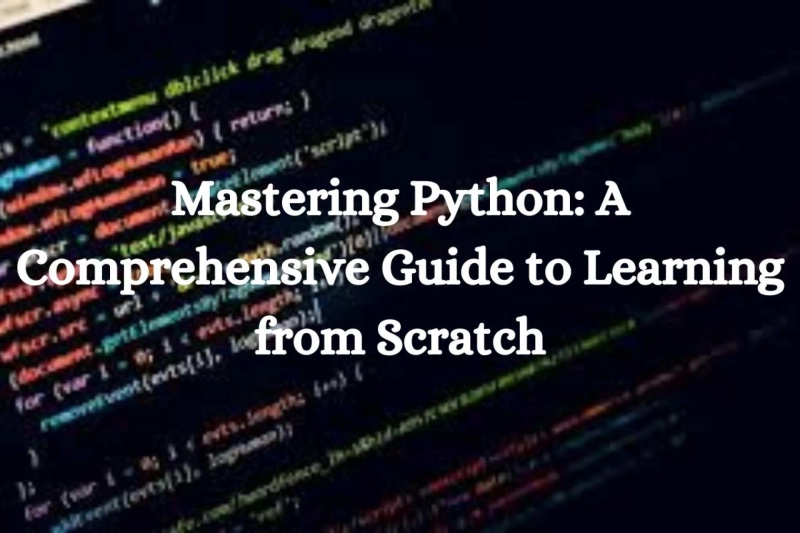Python is a versatile and powerful programming language that has gained immense popularity for its simplicity, readability, and vast ecosystem of libraries. Whether you're a beginner in programming or an experienced developer exploring new horizons, learning Python from scratch can be a rewarding journey.
Top 10 tips to help you master Python and build a strong foundation for your programming skills
Understand the Basics of Python Syntax:
Before diving into complex concepts, familiarize yourself with Python's syntax. Learn about variables, data types, indentation, and basic operations. Python's readability is one of its strengths, so pay attention to the structure of your code.
Interactive Learning with Python Interactive Shell (IDLE):
Python comes with a built-in interactive shell called IDLE. Utilize this environment to experiment with code snippets, test concepts, and get immediate feedback. The interactive shell is an excellent way to reinforce your understanding of Python syntax and functionality.
Explore Online Learning Platforms:
Take advantage of online learning platforms such as Codecademy, Coursera, or edX. These platforms offer interactive Python courses with hands-on exercises, projects, and quizzes. They provide a structured learning path that caters to beginners and gradually introduces more advanced topics.
Practice Regularly with Coding Challenges:
Engage in coding challenges on platforms like LeetCode, HackerRank, or Codewars. These platforms offer a plethora of problems that range from easy to advanced difficulty levels. Regular practice not only hones your problem-solving skills but also reinforces your understanding of Python concepts.
Build Real-world Projects:
Apply your knowledge by working on real-world projects. Whether it's a simple web scraper, a data analysis tool, or a small game, hands-on projects help you consolidate your skills and gain practical experience. GitHub is an excellent platform to showcase your projects and collaborate with the programming community.
Read Python Documentation:
Familiarize yourself with Python's official documentation. It's a valuable resource that provides in-depth information on Python's libraries, modules, and functions. Learning to navigate and understand documentation is a crucial skill for any programmer.
Join Python Communities:
Engage with the Python community by joining forums, discussion groups, and social media channels. Platforms like Stack Overflow and Reddit (r/learnpython) are great for seeking help, sharing experiences, and learning from others. Networking with fellow learners and experienced developers can provide valuable insights.
Master Python Libraries and Frameworks:
Python has a rich ecosystem of libraries and frameworks. Depending on your interests, explore popular ones such as NumPy for scientific computing, Django for web development, or TensorFlow for machine learning. Understanding how to leverage these tools will enhance your capabilities as a Python developer.
Stay Updated with Python Trends:
Python is a dynamic language with regular updates and new features. Stay informed about the latest trends, updates, and best practices. Follow reputable blogs, podcasts, and newsletters to keep your skills relevant in the ever-evolving Python landscape.
Contribute to Open Source Projects:
Contribute to open source projects on platforms like GitHub. Collaborating with other developers on real-world projects not only enhances your coding skills but also exposes you to different coding styles and best practices. It's a valuable experience that can boost your confidence and credibility as a Python developer.
Conclusion:
Embarking on the journey to learn Python from scratch requires dedication, practice, and a strategic approach. By understanding the basics, practicing regularly, and engaging with the Python community, you'll build a solid foundation for your programming career. Remember, learning to code is a continuous process, and the Python programming language offers a vast and exciting landscape for exploration.
FAQs about python from scratch
How many days will it take to learn Python from scratch?
Learning Python from scratch can take anywhere from a few weeks to a few months, depending on factors such as the individual's prior programming experience, the amount of time dedicated to learning each day, and the depth of understanding desired.Is it possible to learn Python from scratch?
Yes, it is absolutely possible to learn Python from scratch. Python is considered a beginner-friendly programming language, and many resources, tutorials, and courses are available for beginners. With dedication, practice, and the right learning materials, individuals can successfully learn Python and gradually build their programming skills.What is the benefit of Python compared to scratch?
Python is a versatile, text-based programming language widely used in real-world applications, while Scratch is a visual, block-based language designed for beginners, primarily in educational settings. Python offers broader applicability and a smoother transition to professional development.Also read
Data Science Training Course: Data Scientist Bootcamp
Best Data Science Course Online with Certificate
Best Data Science Courses Online with Training Certification



